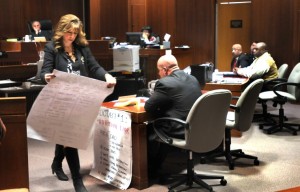Robin Kay Lord, Esq.
210 S. Broad St. Ste B
Trenton, NJ 08608
(609) 393-4499
notguiltyy@aol.com
__
MBA: What originally prompted you to pursue a career in law?
I was always intrigued by the detective work in solving crimes at an early age. Columbo was my hero. When I found out that detectives are cops that carry guns, being afraid of guns, the only logical career was a criminal defense attorney for me.
MBA: Tell me a little bit about your background in law and your current legal practice?
The first decade of my career I was a public defender in New Jersey. In 1996, I opened my own practice, concentrating on criminal defense work. I am also lead trial counsel in civil rights and wrongful death cases with another firm. I find these two to be a nice compliment, allowing me to correct the wrongs that my clients and their families have suffered in both the criminal justice system and the civil justice system.
MBA: In your career, what aspects of working on the defense side have you enjoyed?
I enjoy working with forensic experts that teach me the forensic sciences. This allows me the opportunity to show the jurors the limitations of such evidence, giving them the tools to acquit my clients.
MBA: In your opinion, what are the key issues with DNA analysis in criminal matters at present?
In New Jersey the local crime lab employs some forensic analysts that are both uneducated and inexperienced who testify with such a broad brush on the science of DNA. If the attorney is equally inexperienced in the area, they will be easily defeated by these witnesses in trial. For example, an irrelevant and irresponsible statement by the analyst that “no two people have the same DNA” will be enough to convince a jury to convict regardless if the statistical numbers are 1 in 100 or 1 in 86 quintillion.
MBA: What do you think the overall comfort level is of the defense bar with DNA evidence?
It has been my experience that very few defense attorneys are comfortable challenging the DNA, especially without a defense expert to testify.
MBA: In your opinion, is DNA evidence sometimes ‘oversold’ by prosecutors?
I have yet to try a case where a prosecutor understood DNA and its limitations.
MBA: Do you see the defense as being at a disadvantage when it comes to the use of DNA in cases?
The general public believes DNA is an exact science, and the functional equivalent of fingerprint evidence. It is imperative that the defense educate the jury as early as the opening statement that this just is not true and that it is only an exact science when it “excludes”, but when it “includes” it is meaningless and needs unreliable statistics to give it meaning.
MBA: As a defense attorney, what are important things to remember when dealing with DNA evidence in a jury trial?
Always show up with Dr. Butler’s treatises highlighted and tabbed so you are ready to confront the expert. Make sure you hire an expert to be available to contact during a break or even email during the testimony, when the expert goes astray so you can get advice on reining him or her in.
MBA: What is your biggest fear when DNA evidence is being presented to a jury?
That it will be too complicated for them to understand and that they will simply believe the results because I have been unsuccessful showing them its limitations.
MBA: Anything else you would like to add regarding DNA evidence in the legal system?
Criminal defense attorneys have a duty and a responsibility to their clients to educate themselves on DNA when DNA evidence has been tendered in a case. The ideal situation is to retain an expert to review the discovery and assist in this regard. In the event finances are in issue, apply to the public defender for ancillary services to retain an expert. If all else fails, buy all of Dr. Butler’s books out there and read, read, read. Your client has entrusted his life with you, you cannot let him down.


Excellent interview Mehul. Robin Kay Lord describes an accurate representation of the defense community. I could not agree more that the limitations of the DNA evidence needs to be understood and verbalized to the jury in a way they can understand.
Venessa Silveira,
http://www.DNAConsultingSolutions.com
Hi Venessa,
Thanks for stopping by the blog and sharing your thoughts.